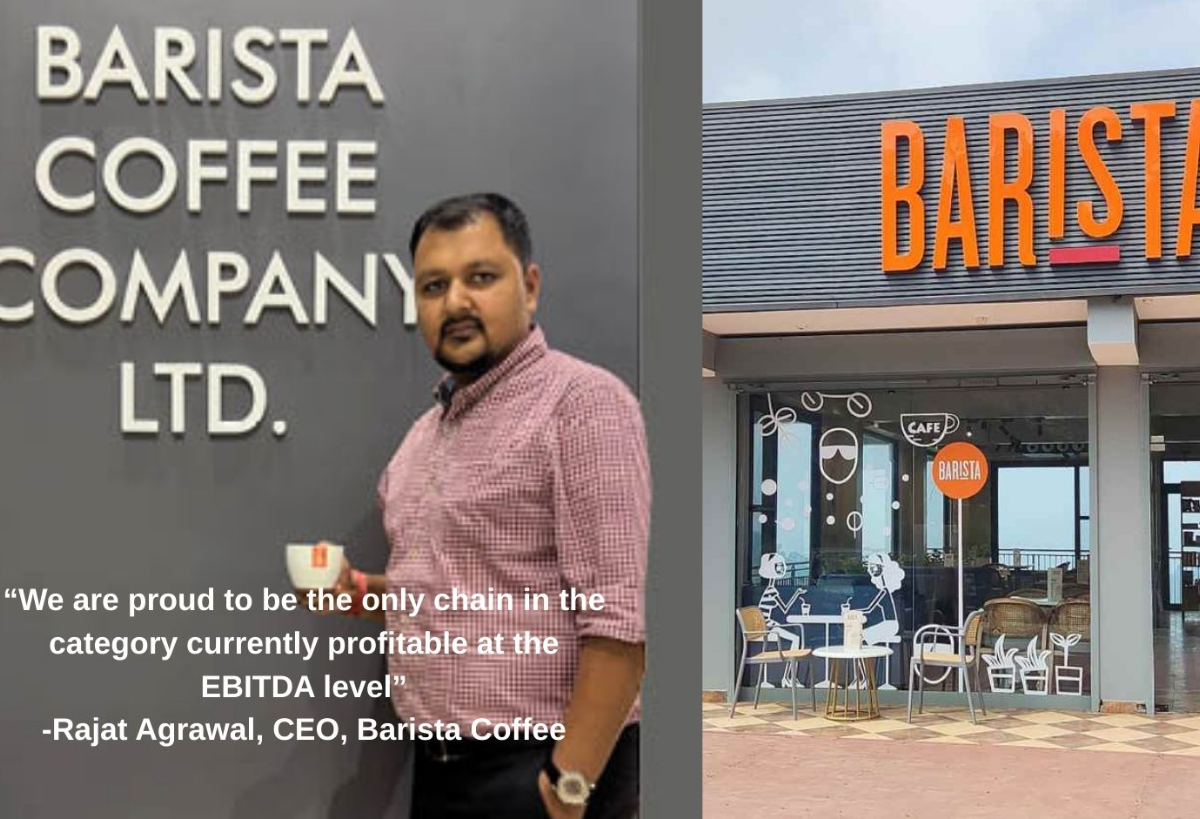Barista Plans 800 Stores In 4-5 Years, Eyes Deeper Global Penetration
Barista Plans 800 Stores In 4-5 Years, Eyes Deeper Global Penetration

Barista, one of India’s oldest and second-largest coffee chains, began its journey in 2000 when café culture in the country was still taking shape. Founded by Turner Morrison, the brand underwent multiple ownership changes before Carnation Hospitality acquired it from Lavazza in 2014. At that time, Barista had around 125 stores.
Today, the chain has expanded to about 480 outlets across more than 160 cities, making it the second-largest homegrown coffee chain. It is also the largest coffee chain in Sri Lanka with over 60 stores.
“Our growth has been steady, opening 60–70 outlets annually. Beyond metros, we see strong potential in Tier II and III cities. We are also proud to be the only chain in the category currently profitable at the EBITDA level,” said Rajat Agrawal, CEO, Barista Coffee.
Domestic and Global Expansion
Barista operates through company-owned stores and franchise partners across India, with around 65 percent of its network concentrated in the north. The brand now aims to accelerate growth in the southeast and west.
We’re already present in over 160 cities and plan to add 50–60 more in the next four to five years, taking us close to 200 cities. Apart from entering new markets, we want to deepen our footprint in cities where we are already present. Punjab, Himachal, and J&K have been strong growth drivers, and we are the largest café chain in these regions,” Agrawal noted.
Internationally, Barista is expanding beyond Sri Lanka and plans to open its first store in the Maldives around Diwali.
“We are also exploring the GCC markets, targeting areas with a strong Indian diaspora,” Agrawal added.
Managing Pricing in a Diverse Market
Barista follows a differential pricing strategy to cater to varied markets. Prices can differ by 20–25 percent between metros and Tier II or III cities, depending on income levels and market potential.
“Coffee shops are about experience, not just price. Customers are willing to spend for quality and ambiance. We ensure product quality, experience, and pricing are balanced across city tiers,” Agrawal explained.
Expanding Beyond Coffee
To appeal to a broader audience, Barista has diversified its menu with non-coffee offerings such as iced teas, milkshakes, cookies, brownies, smoothies, and bobas.
“Non-coffee products now contribute 20–25 percent of our sales. Bobas, which we introduced three years ago, were a first for the chain café segment and have been very well received. Korean flavors are trending, so we launched a Korean festival with flavored croissants, which also worked well,” Agrawal said.
Health-conscious choices are also a focus. The brand has launched zero-sugar cold coffees, frappes, iced teas, and plant-based options like almond and oat milk. It is also exploring matcha-based beverages for metro markets.
Building Loyalty and Experience
Barista’s biggest strength lies in its legacy and loyal customer base.
“Almost 40 percent of customers at high-footfall stores are repeat visitors. With 160+ cities covered, far ahead of many competitors, we can offer a consistent experience whether you are in Delhi or a smaller city like Yamuna Nagar,” Agrawal shared.
Strengthening Digital and Community Connect
Digital platforms are central to Barista’s strategy. The brand launched a loyalty app two years ago and uses Instagram, LinkedIn, and other platforms for customer engagement and campaigns.
“We actively engage on social media to share relevant content and run campaigns. LinkedIn helps strengthen our B2B presence. Digital campaigns amplify reach and help us connect with new-age consumers,” Agrawal said.
Barista is also investing in on-ground activities. Over the past few years, it has hosted coffee education sessions, pottery classes, and handicraft workshops. On the collaboration front, Barista partnered with Twiddles, a health food brand by cricketer Yuvraj Singh, to launch protein bars, trail mixes, and upcoming Diwali gifting collections.
Focused on Profitable Growth
Looking ahead, Barista plans to grow from 480 to about 800 stores in the next four to five years, driven by a robust franchise network. It targets sustained growth and profitability.
“A key point is profitability. Many chains focus only on expansion, but we’ve managed to grow while staying profitable. We are the only profitable chain café brand in the country today, and that is a core strength we’re proud of,” Agrawal concluded.
